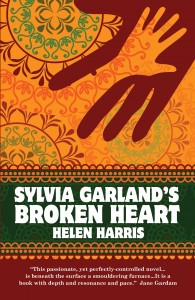![]() This post was contributed by Helen Harris (MA Oxon), associate lecturer in creative writing in Birkbeck’s Department of English and Humanities. Her new novel,Sylvia Garland’s Broken Heart is out now from Halban Publishers. This article was originally published on The Guardian‘s books blog.
This post was contributed by Helen Harris (MA Oxon), associate lecturer in creative writing in Birkbeck’s Department of English and Humanities. Her new novel,Sylvia Garland’s Broken Heart is out now from Halban Publishers. This article was originally published on The Guardian‘s books blog.
 Considering how important grandparents are in many modern families – plugging the gaps and picking up the pieces when the stresses and strains on working parents get too much – isn’t it surprising that we don’t find more of them in contemporary fiction?
Considering how important grandparents are in many modern families – plugging the gaps and picking up the pieces when the stresses and strains on working parents get too much – isn’t it surprising that we don’t find more of them in contemporary fiction?
There is, of course, no shortage of memorable grandparents in children’s literature, beaming benignly – or occasionally malevolently – from the bookshelves: from the four grandparents in Roald Dahl’s Charlie and the Chocolate Factory, via Grannie Island and Granma Mainland in Mairi Hedderwick’s Katie Morag series to David Walliams’ Gangsta Granny, grandparents seem a far richer source of inspiration than boring old parents.
But look around current adult fiction and there’s little writing about grandparents as grandparents. You can find forever-young baby boomer grandmas falling in love at 60 and novels about spirited older women finding self-fulfilment, but novels about grandparents’ relationships with their grandchildren seem in short supply. One rare exception is Finnish writer and illustrator Tove Jansson’s magical The Summer Book. Jansson (of Moomintroll fame) here turns her shrewd gaze on the interaction between an elderly grandmother and her six-year-old granddaughter, spending the summer together on an island in the Finnish archipelago. The book is beautiful, astute and tells us a lot both about childhood and about old age.
When my novel, Sylvia Garland’s Broken Heart, which examines the relationship between a grandmother and her young grandson, was published at the end of 2014, my expectations were low: I hadn’t published a novel for 20 years, my (excellent) publishers are a small independent house and a number of mainstream commercial publishers had previously rejected the book, telling me that it didn’t fit on their lists. So I was quite unprepared for the extraordinary reactions that began almost as soon as the book came out.
 In Sylvia Garland’s Broken Heart, Sylvia’s bond with her grandson is threatened when his parents split up, driving her to extreme measures. I was invited on to Woman’s Hour on Radio 4, together with Jane Jackson of the Bristol Grandparents Support Group, which helps those denied contact with their grandchildren after family breakdown. I was quite panicked at the thought of my fiction side-by-side with real-life heartbreak. During the programme, I learned that a million British children have no contact at all with their grandparents because of some form of family rift. After our discussion, Woman’s Hour received so many emails from listeners with their own stories that they opened the programme the next day with a family therapist talking about the issues raised.
In Sylvia Garland’s Broken Heart, Sylvia’s bond with her grandson is threatened when his parents split up, driving her to extreme measures. I was invited on to Woman’s Hour on Radio 4, together with Jane Jackson of the Bristol Grandparents Support Group, which helps those denied contact with their grandchildren after family breakdown. I was quite panicked at the thought of my fiction side-by-side with real-life heartbreak. During the programme, I learned that a million British children have no contact at all with their grandparents because of some form of family rift. After our discussion, Woman’s Hour received so many emails from listeners with their own stories that they opened the programme the next day with a family therapist talking about the issues raised.
Sobered, I went about my business (including getting on with my next novel). A couple of weeks later, I was interviewed by a journalist who told me her own story of a family breakup triggering a loss of contact with grandchildren. Then a neighbour who had enjoyed the book told me about the predicament of a close friend, denied contact with her beloved grandchildren after their parents divorced. Real life, it seemed, was starting to outstrip fiction.
Last month I gave a reading at JW3, London’s new Jewish community centre. Grandparents were invited to come along and join a discussion of the themes raised by the book. Although the weather was cold enough to deter a much younger audience, the room was full and one after another the audience opened up with their own experiences. One woman, a grandma to 11 grandchildren, reduced many of us to tears with the desperate story of how her ex-son-in-law had denied her access to his children following the death of the children’s mother, her own daughter.
My humorous look at a warring mother-in-law and daughter-in-law suddenly felt rather light-hearted. It was a relief when another member of the audience spoke up: “You know the bit where Sylvia gives her grandson ice cream even though her daughter-in-law doesn’t allow it? I’ve done that.” There was a ripple of recognition around the room.
Other posts by Helen Harris:
